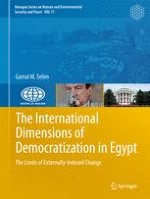2015 | OriginalPaper | Chapter
4. Egyptian Political Transformations Since Independence
Author : Gamal M. Selim
Published in: The International Dimensions of Democratization in Egypt
Publisher: Springer International Publishing
Activate our intelligent search to find suitable subject content or patents.
Select sections of text to find matching patents with Artificial Intelligence. powered by
Select sections of text to find additional relevant content using AI-assisted search. powered by
